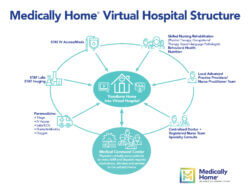October 18, 2021

Home Is Where the Hospital Is
My sister recently gave me a t-shirt that proclaims, “I speak in movie lines, song lyrics and sarcasm.” At least the middle part of that proclamation applies to this month’s song, “Sweet Hospital-at-Home,” sung to the tune of Leonard Skynyrd’s “Sweet Home Alabama.” Click this link to hear 4sight Health’s troubadour John Zam (the “piano man”) perform this October’s surprise.
It’s not like hospital care in the home is a new idea. Beginning in the 1970s, multiple trials have demonstrated that hospital-at-home care reduces costs, readmissions and mortality by over twenty percent with sky-high patient satisfaction. Home cooking never tasted so good.
Hospital-at-home is well established in several countries with government-funded/socialized healthcare systems. These include Great Britain, Canada, Australia and Israel. Johns Hopkins launched its hospital-at-home program in 1994 and has become a national leader in advancing program efficacy. The Veterans Administration, which operates a U.S. version of socialized medicine, launched its own hospital-at-home program over a decade ago.
Like so much in value-based care delivery, the real impediment to expanding hospital-at-home care has been payment. Medicare historically has not paid for acute care services delivered outside hospitals. Without the fee-for-service payments, hospitals had no financial incentive to invest in this high-value treatment alternative.
COVID changed everything. Given dramatically increasing demand for hospital beds, Medicare cried “Uncle.” On November 25, 2020, CMS launched a massive “Acute Hospital Care At Home” program. It provides “eligible hospitals with unprecedented regulatory flexibilities to treat eligible patients in their homes.” Reimbursement followed. Once payment solidified, hospital-at-home programs, like happened with virtual-care patient appointments, grew exponentially.
Simultaneously, several innovative, high-growth, hospital-at-home companies are now in the marketplace and thriving. Money and market share are flowing their way. These upstart companies include Boston-based Medically Home, Nashville-based Contessa Health and Denver-based Dispatch Health.
Mayo Clinic and Kaiser Permanente have invested $100 million in Medically Home, and are partnering with them to expand care capabilities. Home health giant Amedisys just purchased Contessa for $250 million. Seeking to become the nation’s largest in-home care system, Dispatch has raised $335.6 million in round C and D funding since June 2020.
Hospital-at-home companies essentially combine human and technological resources in on-site and remote locations to coordinate care 24/7 for non-ICU hospital patients. They monitor vital signs, administer IV fluids, dispense medications and schedule visits with doctors, nurses, therapists and other medical specialists. The chart from Medically Home illustrates how hospital-at-home care networks integrate and operate.

Facility expenses represent as much as two-thirds of hospital care costs. Moreover, hospitals are dangerous, often foreboding places. Patients are prone to infections and isolation. Given these realities, the future of routine hospitalizations appears to be heading home.
The billion-dollar question is whether CMS will try to put the hospital-at-home genie back in the bottle. As currently designed, Medicare’s Acute-Hospital-At-Home program, with its robust payments and regulatory flexibility, will expire once the COVID pandemic ends. Given the success of hospital-at-home delivery models, it’s difficult to foresee a return to pre-COVID treatment norms. Time will tell.
While the economics and market positioning of hospital-at-home delivery models is fascinating, the true test of their value are the outcomes and experiences they generate for patients. That is the perspective this month’s song takes.
Our protagonist falls sick. Hospitals scare him. He wants to be among his friends and family. He enjoys home-cooked meals. He loves his nurses. Our song’s refrain captures his enthusiasm.
Sweet hospital at home
Where the care is so true
Sweet hospital at home
Makes me feel almost brand new!
When great healthcare works its magic, it is wonderous to behold. Enjoy the song and the vision it creates of healthcare delivery that meets patients’ needs where they feel most at home.





